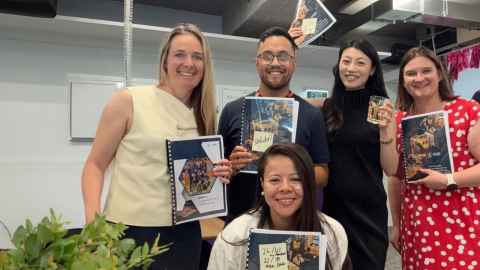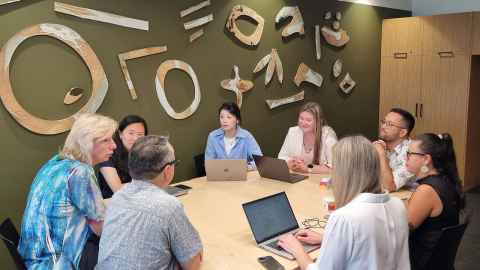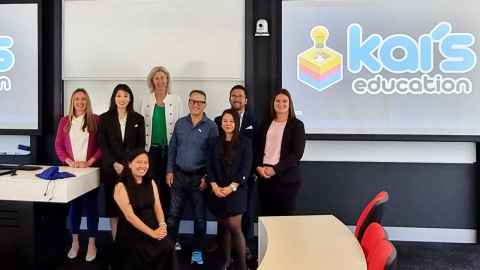Bridging education and industry: the success of an MBA capstone project
14 May 2025
The University of Auckland’s MBA Capstone Project showcases the powerful synergy between academia and industry, benefiting both sides.

In the dynamic world of business education, real-world learning experiences are invaluable. The University of Auckland’s MBA Capstone Project exemplifies how academia and industry can collaborate for mutual benefit. One successful partnership involved students from the University of Auckland’s MBA Programme and Kai’s Education, an innovative New Zealand-based edtech start-up. This partnership not only provided students with hands-on experience but also delivered tangible benefits to the industry partner.
A strategic beginning
The collaboration began with a team led by University of Auckland Professor Chris Woods and MBA Teaching Fellow Dr Wender Martins, who proactively sought an innovative and growth-oriented company well before the start of the course.
“We do not just wait for companies to come to us—we go out and identify firms operating in interesting spaces that could offer meaningful learning opportunities for our students,” Wender explains.
He reached out to Kai’s Education, a company that creates advanced mixed reality robots to make coding and STEAM learning in classrooms more inclusive and collaborative. Kai’s was responsive, open, agile, actively exploring US expansion and proved to be the ideal fit. Kai’s Education Co-founder and CEO Ronel Schodt embraced the collaboration.
Real challenges, real impact
The capstone project is a fantastic micro-experience of working through ambiguous environments, building empathy for your customer and developing a high-performing team.
The student team, led by project manager Rebecca Marquis and supported by Liesl Franklin, Alice Chen, Karen Martinez and Philippe Sheldon Marquis, was tasked with crafting a US market entry strategy.
“This project involved looking for expansion opportunities across five potential states within the United States and creating a strategy for entry to the most preferred of the five states,” Rebecca says.
Kai’s Education had clear expectations. “We saw it as a golden opportunity to stress-test our assumptions. We wanted more than just slick slide decks; we needed real-world validation that our go-to-market plan and pricing actually make sense,” says Ronel. “At the same time, we were excited to uncover fresh angles and untapped opportunities we hadn’t thought of.”

On the ground in San Francisco
A pivotal part of the project was a study trip to San Francisco, where the students immersed themselves in the target market. They conducted interviews with district tech directors and classroom teachers, gathering valuable insights.
Despite time pressures, the team maintained momentum through strong collaboration. “Luckily, I had a great team who were easily motivated to stay on track, and we all worked very hard to get everything done,” Rebecca reflects.
Liesl emphasised the importance of clear messaging. “Strategy is only as good as your ability to sell it. Strategy requires a clear story, understanding the customer journey and needs, and analysing how your product meets those needs. We leveraged our San Francisco experience to build and sell a market penetration strategy for Kai's Education in our final presentation,” she explains.
“They were absolutely hustling—reaching out, setting up meetings, doing street interviews, you name it. That ability to work at pace, without compromising on substance, is something that employers really value,” Wender reflects.
These real-world insights became the foundation of the final recommendations, elevating the practical relevance of their work.
Tangible results for Kai’s Education

They nailed exactly what we asked for. They were energetic, respectful of our timelines and never afraid to challenge our assumptions.
Impressed by the students’ contributions, Ronel says, “They nailed exactly what we asked for: deep, state-by-state customer profiles in each of our four focus markets. They were energetic, respectful of our timelines and never afraid to challenge our assumptions.”
Their research led to actionable outcomes, including prioritising California, enhancing sales collateral and aligning messaging with Universal Design for Learning (UDL) principles.
In the short term, Kai’s updated its pitch deck and initiated conversations with California district contacts. Long-term, the insights informed strategic planning, reinforcing a focus on UDL and scalable growth.
Launching future leaders
The project demanded high levels of adaptability, communication, and leadership—skills essential for executive roles. The experience significantly shaped the students’ professional growth.
“The presentation skills I gained are deeply valuable to me and are something I will use for the rest of my career,” Rebecca says.
Liesl echoes this: “The capstone project is a fantastic micro-experience of working through ambiguous environments, building empathy for your customer and developing a high-performing team.”
“The capstone project is not just an academic exercise; it is about delivering real-world, practical, and implementable recommendations that can make a difference. It gives them a platform to stretch themselves in new ways. The impact of this experience carries well beyond the classroom,” Wender concludes.